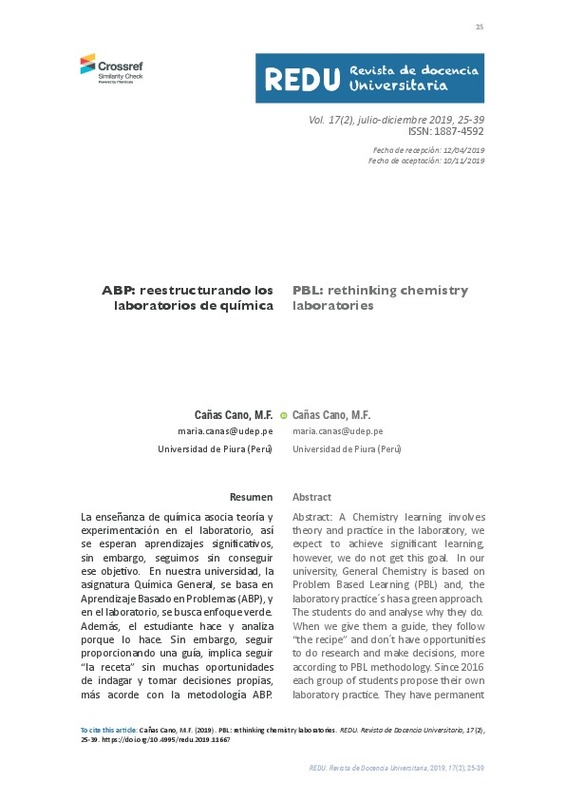JavaScript is disabled for your browser. Some features of this site may not work without it.
Buscar en RiuNet
Listar
Mi cuenta
Estadísticas
Ayuda RiuNet
Admin. UPV
ABP: repensando los laboratorios de química
Mostrar el registro sencillo del ítem
Ficheros en el ítem
| dc.contributor.author | Cañas Cano, María
|
es_ES |
| dc.date.accessioned | 2020-02-21T07:38:49Z | |
| dc.date.available | 2020-02-21T07:38:49Z | |
| dc.date.issued | 2019-12-30 | |
| dc.identifier.issn | 1887-4592 | |
| dc.identifier.uri | http://hdl.handle.net/10251/137439 | |
| dc.description.abstract | [EN] A Chemistry learning involves theory and practice in the laboratory, we expect to achieve significant learning,however, we do not get this goal. In our university, General Chemistry is based on Problem Based Learning (PBL) and, thelaboratory practice´s has a green approach. The students do and analyse why they do. When we give them a guide, they follow “the recipe” and don´t have opportunities to do research and make decisions, more according to PBL methodology. Since 2016 each group of students propose their own laboratory practice. They have permanent feedback for reorienting their proposal. The data collected was qualitative. It involvedobservation, analysis of the student’s perception and their product. It conducted to preliminary conclusions, respect forteamwork, self-learning, and oral writing communication. | es_ES |
| dc.description.abstract | [ES] Enseñar química asocia teoría y práctica en laboratorio, así se esperan aprendizajes significativos, sin embargo, seguimos sin conseguir ese objetivo. En nuestra universidad, el curso Química General, se basa en Aprendizaje Basado en Problemas (ABP) y, en el laboratorio se busca enfoque verde. Además, el estudiante hace y analiza porque lo hace, pero, seguir proporcionando una guía implica seguir “la receta” sin muchas oportunidades de indagar y tomar decisiones propias, más acorde con la metodología ABP. Por ello, desde el año 2016, se propone que cada grupo plantee su propia investigación experimental. Cuentan con retroalimentación para reorientar su propuesta de ser necesario. La data colectada, básicamente cualitativa, consiste en observación, análisis de la opinión estudiantil y del producto entregado, lo que ha permitido extraer conclusiones preliminares, respecto al trabajo autónomo, en equipo, la expresión oral y escrita. | es_ES |
| dc.language | Español | es_ES |
| dc.publisher | Universitat Politècnica de València | es_ES |
| dc.relation.ispartof | REDU. Revista de Docencia Universitaria | es_ES |
| dc.rights | Reconocimiento - No comercial - Sin obra derivada (by-nc-nd) | es_ES |
| dc.subject | Self instruction | es_ES |
| dc.subject | Practical work | es_ES |
| dc.subject | Life skills | es_ES |
| dc.subject | Research strategies | es_ES |
| dc.subject | Professional training. | es_ES |
| dc.subject | Auto-aprendizaje | es_ES |
| dc.subject | Laboratorio universitario | es_ES |
| dc.subject | Percepción estudiantil | es_ES |
| dc.subject | Desarrollo de las habilidades | es_ES |
| dc.subject | Competencia profesional. | es_ES |
| dc.title | ABP: repensando los laboratorios de química | es_ES |
| dc.title.alternative | PBL: rethinking chemistry laboratories | es_ES |
| dc.type | Artículo | es_ES |
| dc.identifier.doi | 10.4995/redu.2019.11667 | |
| dc.rights.accessRights | Abierto | es_ES |
| dc.description.bibliographicCitation | Cañas Cano, M. (2019). ABP: repensando los laboratorios de química. REDU. Revista de Docencia Universitaria. 17(2):25-39. https://doi.org/10.4995/redu.2019.11667 | es_ES |
| dc.description.accrualMethod | OJS | es_ES |
| dc.relation.publisherversion | https://doi.org/10.4995/redu.2019.11667 | es_ES |
| dc.description.upvformatpinicio | 25 | es_ES |
| dc.description.upvformatpfin | 39 | es_ES |
| dc.type.version | info:eu-repo/semantics/publishedVersion | es_ES |
| dc.description.volume | 17 | es_ES |
| dc.description.issue | 2 | es_ES |
| dc.identifier.eissn | 1887-4592 | |
| dc.relation.pasarela | OJS\11667 | es_ES |








